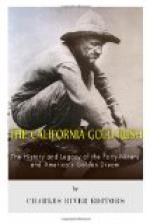Even before the first meeting had adjourned, this signal was given. A certain John Jenkins had robbed a safe and was caught after a long and spectacular pursuit. Jenkins was an Australian convict and was known to numerous people as an old offender in many ways. He was therefore typical of the exact thing the Vigilance Committee had been formed to prevent. By eleven o’clock the trial, which was conducted with due decorum and formality, was over. Jenkins was adjudged guilty. There was no disorder either before or after Jenkins’s trial. Throughout the trial and subsequent proceedings Jenkins’s manner was unafraid and arrogant. He fully expected not only that the nerve of the Committee would give out, but that at any moment he would be rescued. It must be remembered that the sixty or seventy men in charge were known as peaceful unwarlike merchants, and that against them were arrayed all the belligerent swashbucklers of the town. While the trial was going on, the Committee was informed by its officers outside that already the roughest characters throughout the city had been told of the organization, and were gathering for rescue. The prisoner insulted his captors, still unconvinced that they meant business; then he demanded a clergyman, who prayed for three-quarters of an hour straight, until Mr. Ryckman, hearing of the gathering for rescue, no longer contained himself. Said he: “Mr. Minister, you have now prayed three-quarters of an hour. I want you to bring this prayer business to a halt. I am going to hang this man in fifteen minutes.”
The Committee itself was by no means sure at all times. Bancroft tells us that “one time during the proceedings there appeared some faltering on the part of the judges, or rather a hesitancy to take the lead in assuming responsibility and braving what might be subsequent odium. It was one thing for a half-drunken rabble to take the life of a fellow man, but quite another thing for staid church-going men of business to do it. Then it was that William A. Howard, after watching the proceedings for a few moments, rose, and laying his revolver on the table looked over the assembly. Then with a slow enunciation he said, ‘Gentlemen, as I understand it, we are going to hang somebody.’ There was no more halting.”
While these things were going on, Sam Brannan was sent out to communicate to the immense crowd the Committee’s decision. He was instructed by Ryckman, “Sam, you go out and harangue the crowd while we make ready to move.” Brannan was an ideal man for just such a purpose. He was of an engaging personality, of coarse fiber, possessed of a keen sense of humor, a complete knowledge of crowd psychology, and a command of ribald invective that carried far. He spoke for some time, and at the conclusion boldly asked the crowd whether or not the Committee’s action met with its approval. The response was naturally very much mixed, but like a true politician Sam took the result he wanted. They found the lovers of




